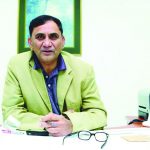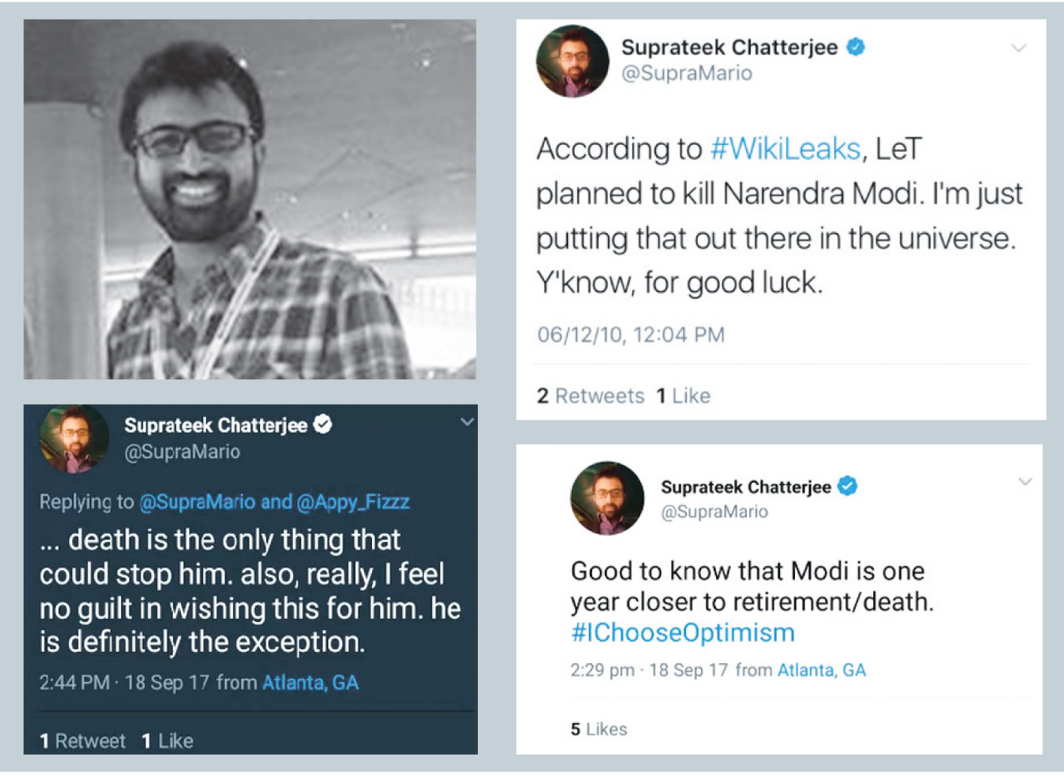The reluctance of the press to indict one of its own for his mortifying tweets on Modi’s death shows its double standards and lack of courage. It calls for deep introspection

~By Bikram Vohra
Columnist Suprateek Chatterjee has placed the media on trial. The general reluctance to pillory him for his outrageous tweets calling for the death of Prime Minister Modi should have had the Indian Federation of Working Journalists and the Press Council taking severe action for what amounts to seditious conduct. No senior editors/writers have stepped up to say that this is not kosher.
The search for refuge in freedom of expression and the right to say what one wants become moot when you publicly call for a killing. Peon or prime minister is irrelevant to that demand.
Instead, we have a mute media and this journalist’s peer group seems content to shy away from the issue. It is all very well to indict Congress leader Manish Tewari and his tribe for their misadventures in Tweetland but when it comes to our own, we wish to apply different standards of conduct.
It is a matter that calls for deep introspection in the Fourth Estate that instead of lauding The Quint for shutting out this writer in the aftermath and protecting its name and staff from any fallout, there seem to be ripples of horror that in some way, press freedom has been compromised. What we really should be doing is taking our member to task for placing us all on the mat by exercising gross excess. Now, we are all on the defensive.
Before we go into the legalities of it all (never mind the niceties), read the three tweets below.
 For the record, which part of this is journalism and wherein lies any edifying element? If this is not a specific call to kill, what is it? It is not even a threat and it does not qualify as the sharing of a thought or a desire. That you wish a terrorist good luck in his endeavour is tantamount to threat.
For the record, which part of this is journalism and wherein lies any edifying element? If this is not a specific call to kill, what is it? It is not even a threat and it does not qualify as the sharing of a thought or a desire. That you wish a terrorist good luck in his endeavour is tantamount to threat.
The US offers protection for even the most revolting expression of thought under the First, Fifth and Sixth Amendments. The First Amendment of the American constitution specially provides that “Congress shall make no law respecting an establishment of religion, or prohibiting the free exercise thereof; or abridging the freedom of speech, or of the press; or the right of the people peaceably to assemble, and to petition the Government for a redress of grievances”.
Under Indian law, the freedom of speech and of the press do not confer an absolute right to express one’s thoughts freely. It is subject to certain basic restrictions. Clause (2) of Article 19 of the Indian constitution enables the legislature to impose certain restrictions on free speech under following heads:
- security of the State,
- friendly relations with foreign States,
- public order,
- decency and morality,
- contempt of court,
- defamation,
- incitement to an offence, and
- sovereignty and integrity of India.
These would all apply to Chatterjee’s missives. It is not just the immature utterances that matter as they are absurd in the extreme, it is the fact that this man thought it fine to practice his profession in this manner and then seek the shelter of the liberal harbour: if you go for me, you are a fascist, but I can be one because it is free speech.
The US allows for more latitude. Those who allow for unrestricted speech, however obscene, go with the argument that just because I wish your death, does not mean I am conspiring to kill you. Ergo, I am not a suspect for murder. Under Indian laws, the fact that you have created a threat from your desires and this threat is sent as a message to those who wish your target harm (in this case terrorists) signifies tacit encouragement. This cannot be seen as freedom of media.
Even in the US, if you recall, Japanese Americans were incarcerated after Pearl Harbour on grounds that they might conspire with Japan. Their freedoms were curtailed. In his latest book, Absence of Evidence, legal expert and author Mark Gimenez makes a telling case of an American imam being denied bail because he fits the bill for a suspect in a possible plot to bomb the stadium of the Dallas Cowboys. The attorney general’s office argues that it is a risk to let him free even though there is not a shred of evidence to tie him to any plot. So, even in that system, there are exceptions.
Let’s take this a step further. When an individual advocates the destruction of another and puts it in the public, he becomes, ipso facto, an accessory before the fact. If some person decides to plot an act of violence, is the promoter guilty by association? Certainly.
Elaborating on the scope of freedom of speech and expression, India’s Supreme Court has said that the words “freedom of speech and expression” must be broadly constructed to include the freedom to circulate one’s views by word of mouth or in writing or through audio-visual instrumentalities. Freedom of speech and expression means the right to express one’s own convictions and opinions freely by word of mouth, writing, printing, pictures or any other mode. It thus includes the expression of one’s idea through any communicable medium or visible representation such as gestures, signs and the like.
It is important to note that liberty of one must not offend the liberty of others. To quote the court: “Man as a rational being desires to do many things, but in a civil society his desires will have to be controlled with the exercise of similar desires by other individuals.”
And herein lies Chatterjee’s flaw. Whether he was moved by personal animosity or simply was grandstanding in the hope of being controversial and therefore, obtaining publicity, he has infringed on the rights of Narendra Modi to live his life devoid of threat. It does not stop here.
Freedom of speech, though guaranteed, is not absolute in India. Unlike the US constitution, the text of India’s constitution clearly sets out restrictions on free speech. The legal system states that anything which is “offensive to modesty or decency; lewd, filthy and repulsive” is exempted from freedom of speech.
Chatterjee is not an amateur blogger. He is a career journalist and must, therefore, be measured by a higher standard. By his unprecedented willfulness, he has caused the profession grievous harm. One of main reasons why media is not reacting vociferously in indicting one of its own is because it is loath to surrender even a tendril of its prerogatives. It sits badly to have to support restrictions on freedom even if the context calls for it. In this should lie rage against Chatterjee for putting us on the spot. Once we start condemning our own people for misconduct, to what point does the right of expression unravel? No wonder we are silent.
The question then is: should we take our lumps and accept the fact that these tweets crossed the line. Perhaps we will come out stronger rather than behave in the current cowardly fashion and duck the issue.


